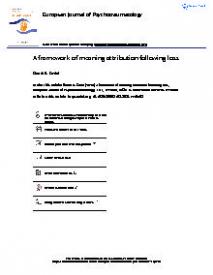A framework of meaning attribution following loss
The loss of a loved one causes the world and the place of the bereaved survivor in it to change irreversibly. A key aspect of the grieving process is the integration of the loss in the bereaved survivor’s life story, identity change, and a new future orientation through meaning attribution. Meaning attribution can have favourable or unfavourable effects on the grieving process and hence determines the extent to which a loss disrupts the bereaved survivor’s functioning.
A framework of meaning attribution after loss is presented, comprising 17 determinants that fall into five categories: event-related, cultural, social, individual and relational determinants. Each determinant may lead to both positive and negative meanings, thereby facilitating or complicating the grieving process. The framework of meaning attribution highlights the importance of an integrated network for mental health care, spiritual care, and end-of-life care in the prevention and treatment of traumatic grief. It also emphasizes the support from relatives, collective rituals, cultural views, legal settlements, and other societal factors that may foster or impede adaptation to loss.
The framework of meaning attribution informs research across a range of research themes, including specialist care for traumatic grief, a culturally sensitive care network for traumatic grief, and improving care for ambiguous loss in a global context.
HIGHLIGHTS
• Meaning attribution is an adaptive process that reduces the fear of the unknown.
• Event-related, cultural, social, individual and relational determinants impact on meaning attribution following loss.
• Research into meaning attribution is characterized by interdisciplinarity, methodological pluralism, and explicit orientation within the sociocultural context.
In: European Journal of Psychotraumatology ; ISSN: 2000-8066 | 11 | 1 | october | 1776563
https://doi.org/10.1080/20008198.2020.1776563


